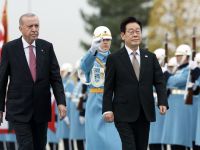The war in Afghanistan has spurred pundits, economists and political scientists the world over to gaze into an ever-cloudier crystal ball, predicting everything from a military disaster to a healthier US economy.
Much of the analysis has focused on the anti-terror war’s economic effects. Following the first bombing of Afghanistan, Reuters reported that the strikes “could actually help [US businesspeoples’] confidence, assuming that there are clear and visible successes.”
"It's a lot worse waiting," one economist Joel Naroff told the agency. "Assuming everything goes well, it's the start of a process that people will finally feel good about. But right now, we don't know a whole lot."
As the attacks have grown in scale and ferocity, BusinessWeek Online has laid out what it sees as the four likely outcomes of the conflict, which range from rosey to grim.
In their first scenario, Northern Alliance forces take over the country, US troops eventually capture Osama bin Laden, and the bases of bin Laden’s Al Qaeda network are pounded to dust by bombs and missiles. BusinessWeeks predicts this would cost US casualties, more terrorist attacks due to bin Laden’s martytdom, and “domestic pressure to take the war on terrorism to countries such as Iraq, Indonesia, and Malaysia.”
In the second BusinessWeek case, bin Laden slips through the US net after a prolonged hunt, and “critics warn that the US is being drawn into a Vietnam-style quagmire.” The risk the US runs here would be stresses on US-led anti-terror coalition and the threat of new terrorist attacks.
In the supposed best-case scenario, the Taliban regime dissolves while the US and British commandos run roughshod over Al Qaeda, strengthening moderate Muslim regimes and debilitating fundamentalist groups in the process. Another “big win” in this case would be that “US pressure prompts new talks between Israel and the Palestinians” and warmer US ties result with Russia, Pakistan, and Iran. The downside, according to BusinessWeek, would be gigantic increases in US economic and military aid to allies, both old and new.
The worst-case scenario the BusinessWeeks analysts could envision was the capture of bin Laden, but accompanied by a string of Islamic uprisings from Pakistan to Indonesia, toppling some anti-terror coalition governments. The magazine assessed the possible costs as a new Cold War, ostensibly against Islamic fundamentalists, global economic instability resulting from turmoil in the Mideast, and last but not least, another Arab-Israeli war.
While the BusinessWeek report takes the stance that both disaster and glory are possible outcomes of the war, analysts from regions like Asia have been less optimistic.
“Before terrorism jolted the world, [Asia] was sliding into its second crisis in less than four years,” AsiaWeek reported in the bleakly titled Waiting for Doomsday. Now, instead of forging with badly needed reforms, Asia is “cowed by the specter of war.”
According to the report, Asian businesses are worried that already weak economies will be tipped into outright recession. "The likely consolidation of the American consumer - widely viewed as the world's consumer of last resort - could well deal a harsh blow to the broader global economy," Stephen Roach, chief economist for Morgan Stanley, told AsiaWeek.
Meanwhile, there is another scenario: Afghanistan is only the beginning.
“[If} Bush's statements are to be taken at face value, this is only stage one of the war against terrorism. The next steps, in all likelihood, will include raids on terrorist camps in other countries, along with air strikes against states that are said to aid the terrorists,” according to Foreign Policy InFocus.
The online journal says it is impossible to forsee which alleged terrorist groups Washington will go after, but “likely candidates include Hezbollah in Lebanon, the Islamic Movement of Uzbekistan (IMU), Islamic Jihad in Egypt, and Abu Sayyef in the Philippines. It is also likely that Washington will step up its indirect war against the guerrilla groups in Colombia.”
In some cases, says Foreign Policy InFocus, these operations may be relatively humble, involving cooperation with local government forces in short-term commando raids. Others, however, could evolve into much larger campaigns, complete with multiple air strikes and the extended deployment of ground troops.
“Given that these organizations typically operate in remote, inhospitable areas, and have resisted repeated attacks by local government forces, there is a very real danger that American forces could get drawn into costly and protracted conflicts like those once encountered in Southeast Asia,” adds the report.
The slew of scenarios proposed to date are diverse and often lack detail. But all reflect at least one factor: deep uncertainty. The developing war in Afghanistan, the chances of bin Laden's’capture, the odds against uprisings in places like Indonesia and Pakistan, have all conspired to throw open a vastly darker and more complicated future than anyone could have predicted before Sept. 11.
© 2001 Al Bawaba (www.albawaba.com)







